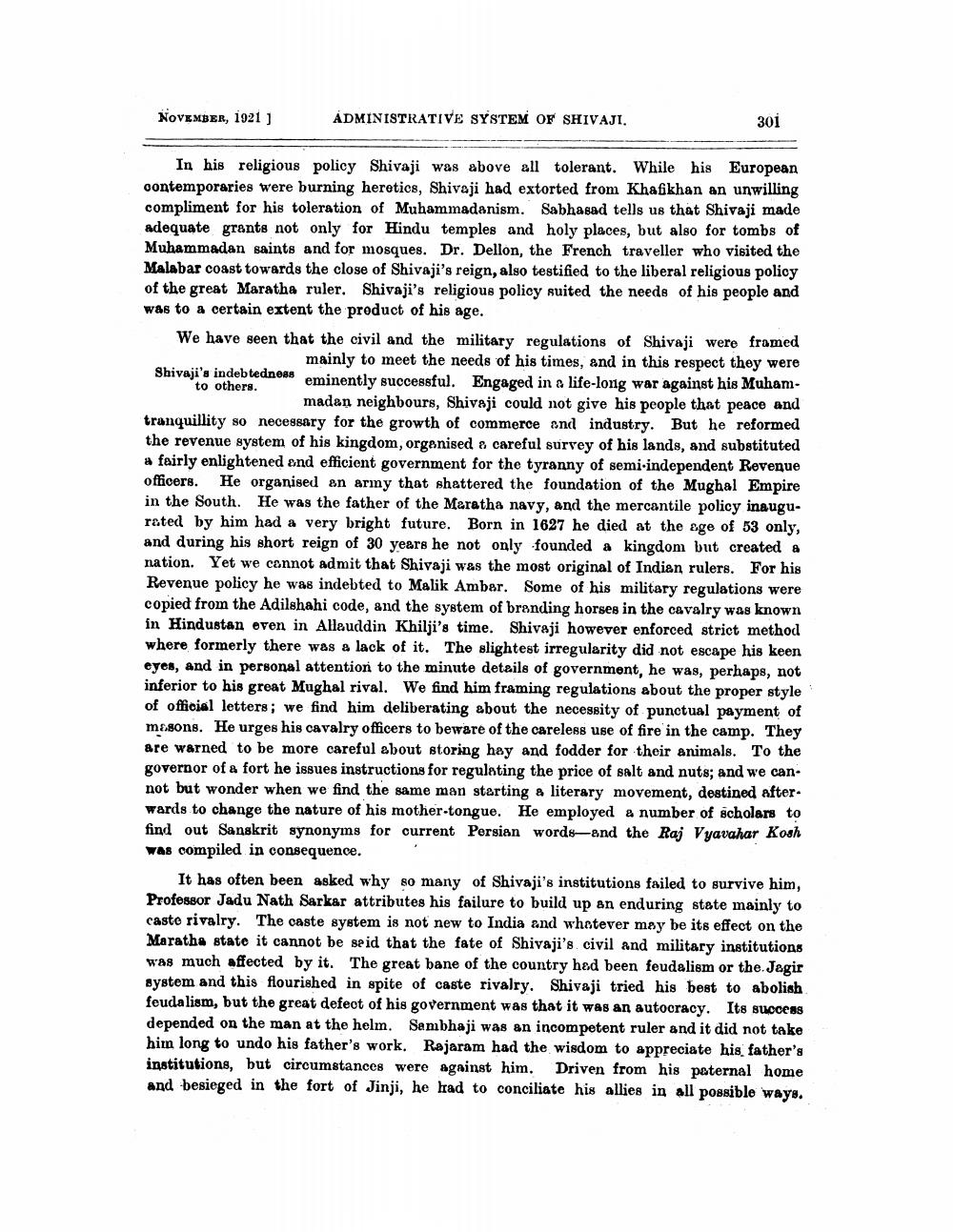________________
NOVEMBER, 1921 ]
ADMINISTRATIVE SYSTEM OF SHIVAJI.
301
In his religious policy Shivaji was above all tolerant. While his European contemporaries were burning heretics, Shivaji had extorted from Khafikhan an unwilling compliment for his toleration of Muhammadanism. Sabhasad tells us that Shivaji made adequate grants not only for Hindu temples and holy places, but also for tombs of Muhammadan saints and for mosques. Dr. Dellon, the French traveller who visited the Malabar coast towards the close of Shivaji's reign, also testified to the liberal religious policy of the great Maratha ruler. Shivaji's religious policy suited the needs of his people and was to a certain extent the product of his age.
Shivaji's indebtedness to others.
We have seen that the civil and the military regulations of Shivaji were framed mainly to meet the needs of his times, and in this respect they were eminently successful. Engaged in a life-long war against his Muhammadan neighbours, Shivaji could not give his people that peace and tranquillity so necessary for the growth of commerce and industry. But he reformed the revenue system of his kingdom, organised a careful survey of his lands, and substituted a fairly enlightened and efficient government for the tyranny of semi-independent Revenue officers. He organised an army that shattered the foundation of the Mughal Empire in the South. He was the father of the Maratha navy, and the mercantile policy inaugurated by him had a very bright future. Born in 1627 he died at the age of 53 only, and during his short reign of 30 years he not only founded a kingdom but created a nation. Yet we cannot admit that Shivaji was the most original of Indian rulers. For his Revenue policy he was indebted to Malik Ambar. Some of his military regulations were copied from the Adilshahi code, and the system of branding horses in the cavalry was known in Hindustan even in Allauddin Khilji's time. Shivaji however enforced strict method where formerly there was a lack of it. The slightest irregularity did not escape his keen eyes, and in personal attention to the minute details of government, he was, perhaps, not inferior to his great Mughal rival. We find him framing regulations about the proper style of official letters; we find him deliberating about the necessity of punctual payment of masons. He urges his cavalry officers to beware of the careless use of fire in the camp. They are warned to be more careful about storing hay and fodder for their animals. To the governor of a fort he issues instructions for regulating the price of salt and nuts; and we can. not but wonder when we find the same man starting a literary movement, destined after. wards to change the nature of his mother-tongue. He employed a number of scholars to find out Sanskrit synonyms for current Persian words-and the Raj Vyavahar Kosh was compiled in consequence.
It has often been asked why so many of Shivaji's institutions failed to survive him, Professor Jadu Nath Sarkar attributes his failure to build up an enduring state mainly to caste rivalry. The caste system is not new to India and whatever may be its effect on the Maratha state it cannot be seid that the fate of Shivaji's civil and military institutions was much affected by it. The great bane of the country had been feudalism or the. Jagir system and this flourished in spite of caste rivalry. Shivaji tried his best to abolish. feudalism, but the great defect of his government was that it was an autocracy. Its success
depended on the man at the helm. Sambhaji was an incompetent ruler and it did not take him long to undo his father's work. Rajaram had the wisdom to appreciate his father's institutions, but circumstances were against him. Driven from his paternal home and besieged in the fort of Jinji, he had to conciliate his allies in all possible ways.




